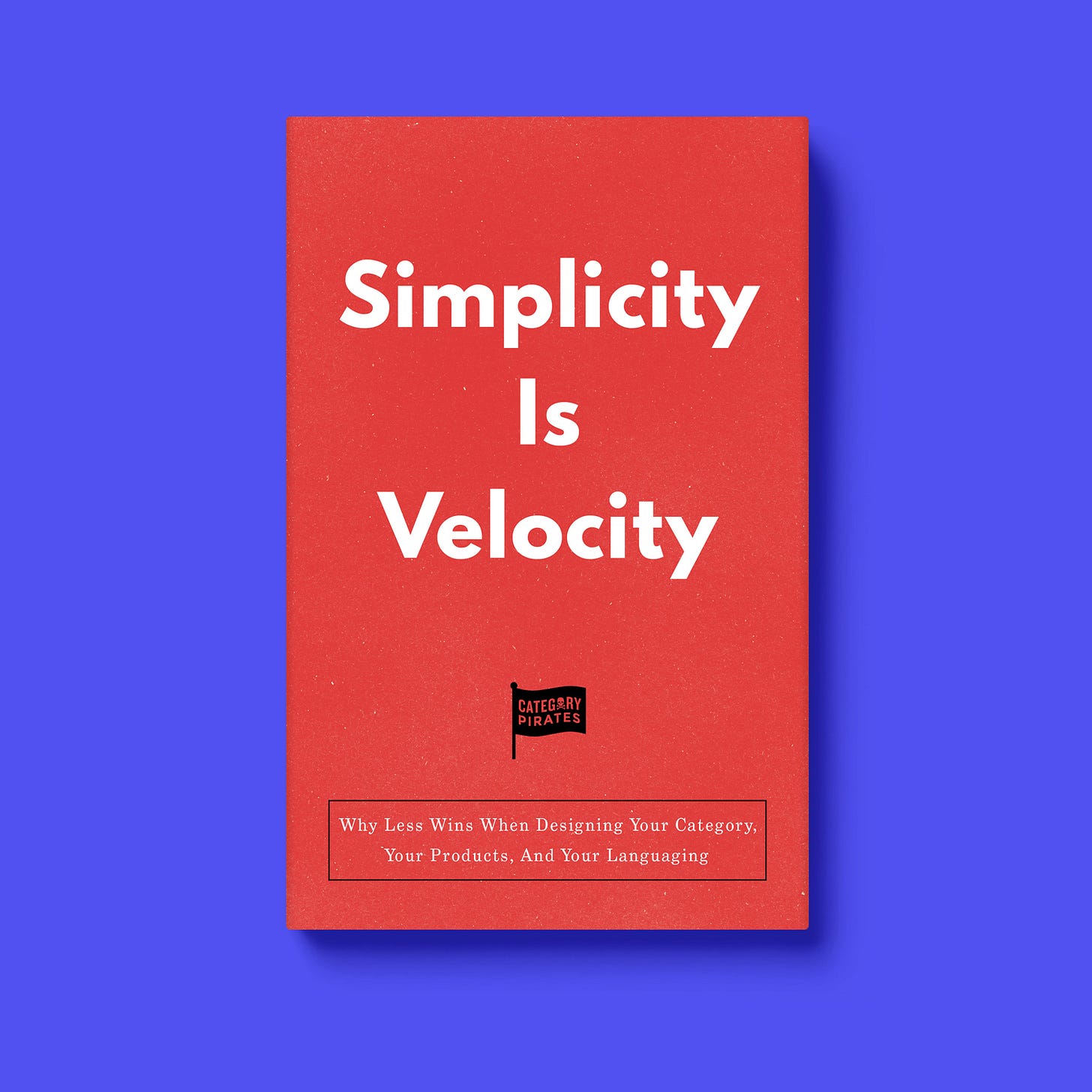Simplicity Is Velocity: Why Less Wins When Designing Your Category, Your Products, And Your Languaging
Simplicity is a deliberate choice to create something that is enjoyable for customers, profitable for your business, and more likely to succeed in the long run.
Arrrrr! 🏴☠️ Welcome to a 🔒 subscriber-only edition 🔒 of Category Pirates. Each week, we share radically different ideas to help you design new and different categories. For more: Dive into an audiobook | Listen to a category design jam session | Enroll in the free Strategy Sprint email course
Dear Friend, Subscriber, and Category Pirate,
In 2013, a pair of smart glasses became available for consumer beta testing.
The glasses had impressive features, like a tiny computer screen, voice recognition, and augmented reality capabilities. Beta testers attended lavish curated events to pick up their pairs. And before taking the glasses home, they got trained on how to use the $1,500 device from company employees.
The glasses had plenty of positive news…at first.
The initial release targeted developers and early adopters by positioning the device as a niche product. But this put off people not wearing the new glasses, as it seemed to be a symbol of Silicon Valley techno-elitist behavior. So the beta testers of these marvels of innovation got a most unfortunate nickname.
(We’ll tell you soon. Keep reading. 🏴☠️)
On top of that, everyone soon realized the glasses were a nightmare to use.
They required a ton of technical know-how, which made them less appealing to the average person. People also had major privacy concerns because the glasses could take pictures and record videos without the wearer’s knowledge. (No one wanted to be labeled a “Glasshole.”) So, consumers hesitated to buy them—and the hype died. This made it difficult for the company to market the device, and it discontinued consumer sales in 2015.
The device, Google Glass, ended up being a total flop.
Why? It was just too damn complicated.
The glasses solved so many problems that no one knew what it did or who it was for. And it ultimately became another example of, “That product is so feature-rich, no one uses it anymore.” (Sidenote: Google is attempting to bring Glass back so there might be new Glassholes walking around soon.)
🔊 Want to listen to this mini-book instead? Head to the audiobook.
Unfortunately, complexity is a common product development pitfall.
Complex categories and products often fail to find their footing in the real world.
As consumers, don’t want complexity or choice. We want simplicity. We want to look at a product or offering and immediately understand what value it can bring to our lives. We want to be able to make a quick decision and move on with our day.
Consumers don’t buy complexity.
Simplicity Speeds Up Your Company, Product, And Category Growth
Simplicity is a deliberate choice to create something that is enjoyable for customers, profitable for your business, and more likely to succeed in the long run.
It expands category potential, which expands the total addressable market (TAM) for your category. For example, the graphic design platform Canva makes it simple to create custom graphics. You don’t need to be a trained designer to understand how to add text and brand colors to a social media banner. It takes three clicks.
(It’s so easy, even Pirate Christopher can do it without help from a Native Digital!)
This simplicity helped attract millions of daily users to Canva, which is why the company reached a $40 billion valuation in 2021.
Canva is just one leader in the broad new software category called “No Code.” These services transform a deeply technical task (web design, app development, workflow automation, etc.) into something radically simple. This simplicity creates massive new category potential by introducing a much broader, non-technical potential customer to the category. Just like how the radically simple camera in our smartphones turns everyone into a decent photographer.
When you simplify complex things, you increase the scale.
Simplicity lowers the barrier to entry by increasing the number of people who can participate.
Think about Canva—it makes graphic design easier, which increases the amount of digital creativity in the world. You don’t have to go through extensive training. You can use templates and illustrations to create whatever is in your mind.
As a Category Designer, you can leverage simplicity in your category, products or offerings, and Languaging to dramatically increase your category’s potential. All you have to do is make everything easier for consumers. Seems straightforward, right?
Here’s the thing: Simple is hard.
In fact, it can be incredibly challenging.








